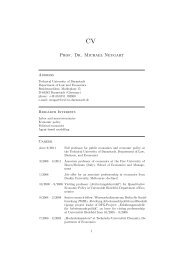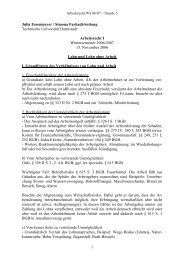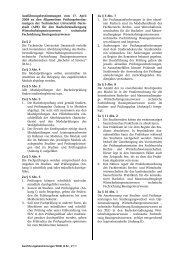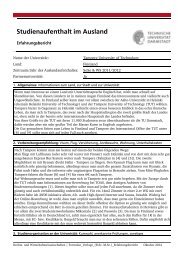Titel für - Fachbereich Rechts- und Wirtschaftswissenschaften
Titel für - Fachbereich Rechts- und Wirtschaftswissenschaften
Titel für - Fachbereich Rechts- und Wirtschaftswissenschaften
Sie wollen auch ein ePaper? Erhöhen Sie die Reichweite Ihrer Titel.
YUMPU macht aus Druck-PDFs automatisch weboptimierte ePaper, die Google liebt.
Corporate Finance II: Nachdem in der Veranstaltung "Corporate Finance I" die Eigenkapitalfinanzierung der<br />
Unternehmen betrachtet wurde, beschäftigt sich die Vorlesung "Corporate Finance II" mit dem Spektrum<br />
der Fremdkapitalfinanzierung. Zunächst wird auf die Möglichkeiten der Bankfinanzierung eingegangen. Es<br />
werden theoretische Modelle zur Existenzerklärungen von Banken, der optimalen Ausgestaltung von<br />
Kreditverträgen, Kreditrationierung <strong>und</strong> Relationship Banking vorgestellt. Im zweiten Teil werden die<br />
Instrumente zur Fremdkapitalfinanzierung am Kapitalmarkt vorgestellt. Dabei steht die Funktionsweise <strong>und</strong><br />
Bewertung verschiedener Unternehmensanleihen im Vordergr<strong>und</strong>. Schließlich werden unterschiedliche<br />
Kreditderivate <strong>und</strong> deren Nutzen auf Unternehmensseite analysiert.<br />
Corporate Finance III: Die Vorlesung gibt einen breiten Überblick über zentrale Themen der modernen<br />
Corporate Finance (wie Fusionen <strong>und</strong> Übernahmen, die finanzielle Notlage, Leitungs-Anreize,<br />
Ausschüttungspolitik, Corporate Governance <strong>und</strong> empirische Methoden). Der Kurs wird Studierenden in<br />
theoretische Konzepte <strong>und</strong> empirische Forschung einführen <strong>und</strong> auf die zentralen Fragen der<br />
Unternehmensfinanzierung eingehen. Am Ende des Kurses sollen die Studierenden über ein allgemeines<br />
Verständnis der wichtigsten Themen in der theoretischen <strong>und</strong> empirischen Corporate Finance <strong>und</strong> die<br />
Methoden verfügen. Die Vorlesung wird auf Deutsch gehalten <strong>und</strong> Studierende sollen Aufsätze bzw.<br />
Buchkapitel entsprechend vorbereiten. Die schriftliche Prüfung wird in Deutsch abgehalten.<br />
Contents:<br />
Real Estate Management I: F<strong>und</strong>amentals of Real Estate Management, Utilization of Real Estate<br />
(CREM/PREM), Property Management, Real Estate appraisal<br />
Real Estate Management II: Real Estate development, Real Estate investment and finance, Real Estate as capital<br />
investment<br />
Project Finance: Public Private Partnerships, investment and financing, project financing, traffic infrastructure<br />
Corporate Finance I: The course provides a detailed analysis of the advantages and disadvantages of raising<br />
capital via public capital markets. Equity financing is the focus of this course. Students learn about the<br />
mechanism and reasoning behind Initial Public Offerings (IPO). In particular, the course examines<br />
conceptual and application perspectives related to initial <strong>und</strong>erpricing of IPOs, the valuation of IPOs, and<br />
different allocation procedures of shares. Theoretical discussions are followed by empirical findings to each<br />
topic. Then, the rational of seasoned equity offerings (SEO) is analyzed. Topics include the legal framework<br />
in different countries, cycles, <strong>und</strong>epricing, and performance of SEOs. The rational of corporate cross-listing<br />
decisions is examined as well. The second part of the course focuses on debt financing. Students are<br />
introduced to bond markets. The emphasis is on bond pricing as well as reasons, characteristics and types<br />
of corporate bonds.<br />
Corporate Finance II: Whereas "Corporate Finance I" focuses primarily on equity financing, "Corporate Finance<br />
II" aims for ways a company can finance itself via debt. We first introduce bank based lending. Theoretical<br />
models on the existence of banks, optimal credit contracts, credit rationing, and relationship banking are<br />
covered. Second, we introduce market based lending. We discuss the characteristica of different kind of<br />
bonds and the f<strong>und</strong>amental principals in bond valuation. Finally, debt contracts and derivaties are covered.<br />
Corporate Finance III: This lecture gives a broad overview of central topics in modern corporate finance (such<br />
as mergers and acquisitions, financial distress, managerial incentives, payout policy, corporate governance<br />
and empirical methods). The course will introduce students to theoretical concepts and empirical research<br />
on central topics of corporate finance. By the end of the course, students will have a general <strong>und</strong>erstanding<br />
of the main issues in theoretical and empirical corporate finance and the methodologies used to obtain<br />
these results. The lectures will be held in German and students will have to read paper or book chapter for<br />
each lecture. The final written test will be in German.<br />
Lernergebnisse:<br />
Die Studierenden sind nach den Veranstaltungen in der Lage,<br />
• die Immobilie als Betriebsmittel, insbesondere Planung des Flächenbestands, Bereitstellungsvarianten, Facility<br />
Management, zu verstehen.<br />
• den Betrieb <strong>und</strong> die Verwaltung von Immobilien als Anlageobjekte: Asset- <strong>und</strong> Propertymanagement, Kostenmanagement<br />
<strong>und</strong> Informationssysteme zu verstehen.<br />
• Verfahren der Immobilienbewertung zu verstehen <strong>und</strong> anzuwenden.<br />
• Verfahren der Immobilienbewertung zu verstehen <strong>und</strong> anzuwenden.<br />
• die Immobilie als Betriebsmittel, insbesondere die Planung des Flächenbestands, Bereitstellungsvarianten,<br />
Kostenmanagement <strong>und</strong> Facility Management zu verstehen <strong>und</strong> anzuwenden.<br />
• die Prozesse in der Projektentwicklung zu verstehen.<br />
• Immobilien-Investitionsrechnungen zu verstehen <strong>und</strong> anzuwenden<br />
<strong>Rechts</strong>- <strong>und</strong> <strong>Wirtschaftswissenschaften</strong> | Wirtschaftsinformatik | M.Sc. | Modulhandbuch 111













